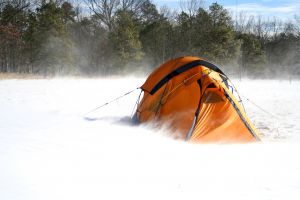Originally published Jan. 16, 2013 by Grit Magazine
Marie and I have always had a love of dogs and enjoyed the company of canines. Trained to behave in a civilized manner and be indoors with us much of the time, they were more members of the family than pets. Last summer we lost both of our pampered pooches.
 First was Zadie. She was accustomed to heading up into the woods in the morning with her adoptive sibling Dolly and their friend from down the road, Boots. That day was no different except that they did not return for breakfast. It wasn’t like Zadie to miss a meal. Any meal. Ever. And we became concerned. Later in the morning Dolly returned, without Zadie (also unusual) and acted very strangely.
First was Zadie. She was accustomed to heading up into the woods in the morning with her adoptive sibling Dolly and their friend from down the road, Boots. That day was no different except that they did not return for breakfast. It wasn’t like Zadie to miss a meal. Any meal. Ever. And we became concerned. Later in the morning Dolly returned, without Zadie (also unusual) and acted very strangely.
 Dolly had been dumped on this mountain before we arrived. When we moved into this home, she watched us for a while from a rocky outcropping above us, then decided she would take us under her wing (so to speak) and teach us to be proper mountain folk. By this time we had been together for about 11 years. Zadie arrived as a pup – apparently dumped as well – and Dolly took her in and mentored her in proper civilized behavior. One of her most adamant tenants was that good dogs don’t “go” in their yard, but head up into the trees to do their business. I particularly appreciated this personal habit. But starting after Zadie’s disappearance, Dolly would not go more than a couple of feet past the tree line for her personal hygiene needs and NEVER went off a-wandering or chasing small game as she always had before.
Dolly had been dumped on this mountain before we arrived. When we moved into this home, she watched us for a while from a rocky outcropping above us, then decided she would take us under her wing (so to speak) and teach us to be proper mountain folk. By this time we had been together for about 11 years. Zadie arrived as a pup – apparently dumped as well – and Dolly took her in and mentored her in proper civilized behavior. One of her most adamant tenants was that good dogs don’t “go” in their yard, but head up into the trees to do their business. I particularly appreciated this personal habit. But starting after Zadie’s disappearance, Dolly would not go more than a couple of feet past the tree line for her personal hygiene needs and NEVER went off a-wandering or chasing small game as she always had before.
 Boots was oddly absent as well. He used to visit every morning, but for days we had not seen hide nor hair of him. Finally I did catch a glimpse of him, waved and shouted “Hi Boots!”. He tucked his tail and scurried off as though I’d threatened him.
Boots was oddly absent as well. He used to visit every morning, but for days we had not seen hide nor hair of him. Finally I did catch a glimpse of him, waved and shouted “Hi Boots!”. He tucked his tail and scurried off as though I’d threatened him.
Being a Border Collie/Rottweiler mix, Zadie was very smart – in terms of being clever. She could open any door and would paw a spring clip until it opened and she was gone. To tether her required a padlock. She was nimble too: 68 pounds of canine ninja.
Dolly may not have been as clever, but was very wise. She was also compassionate and an excellent mentor to Zadie and Cochise.
Shortly before this occurred there had been a fire on Hogback Mountain: the next mountain over from ours. It had burned for days and the Forestry Department was using bulldozers and helicopters to fight it.
A while after this day my nearest neighbor and I both heard what we were sure was a bear snorting and snuffling in the woods above us. We think the bear got Zadie. Most likely The Three Pooches caught its scent and tracked it. We did not hear barking that morning, but if they came up on the bear suddenly, they might not have. Seeing a bear kill Zadie would account for the trauma Boots and Dolly exhibited. Zadie would have been cocky enough to take on the beast, Dolly would have recognized the danger and stayed back. Boots was all bark and no backbone.
A few months later, Dolly died of heart failure, with her head in my lap.
We were deeply hurt by the loss of Zadie, and devastated when Dolly passed on as well. They were our children. Rather than wallowing in our own pain, we chose to focus on the good times we had together and celebrate the fact that they had shared our lives at all.
When we abandoned hoping that Zadie would be found or come home, we were not considering adopting another dog but we did want to do something to help repay the joy they’d brought into our lives. Marie found the Dogs In Danger web site, which works with the Rolling Rescue program to save dogs in kill shelters and relocate them to no-kill shelters or breed-specific rescue programs. We were surprised to learn that our local Animal Shelter works with both programs and decided to see what we could do to help out.
Our local shelter’s greatest need was foster homes for dogs that were too sick to qualify for local adoption or Rolling Rescue. Mostly this involves heart worm positive dogs. Treatment is expensive and makes them very sick for a while. If donations from the public pay for the meds, they require an environment where lots of attention can be paid to them and their activity severely restricted until they recover. An animal shelter is not such an environment.
 One of the dogs they had on this list was Cochise, an American Bulldog who had been there long enough that he was just 4 days away from taking the one way walk. He had a sponsor for his meds, but no foster home. Something about him touched our hearts and we decided to help him.
One of the dogs they had on this list was Cochise, an American Bulldog who had been there long enough that he was just 4 days away from taking the one way walk. He had a sponsor for his meds, but no foster home. Something about him touched our hearts and we decided to help him.
We bought a 10’ x 10’ chain link dog pen and built a make-shift sleeping shelter out of wire fence and a tarp (we called it his wickiup). It rained all that weekend, but he could not afford for us to wait for better weather, we put it all in and went back for him.
That was seven months ago. Cochise turned out to be such an amazing animal that after nursing him back to health we adopted him. He in turn has helped us help four others (so far). The two that have completed the process went to facilities in New Jersey. Marie says it’s like the witness protection program: a new name and off to New Jersey. They must have a tremendous need for good dogs out East.
So far, Cochise’s only objection to any of this is that he just gets them trained to be good playmates and we ship them off. I understand that feeling: I was an Air Force brat as a kid, my family moved every year, leaving all our friends behind never to be seen again. It was hard. We might have to adopt one more – maybe Faith – as a steady playmate for him. But that will be up to him more than us.
One thing though: none of the dogs are allowed to run loose anymore. Cochise and I go for long walks up the mountain, but he’s always on a leash, and we’ve fenced in two large areas for the dogs to use as play yards, but no more running the mountain. Aside from the danger that the bear may still be around, Cochise and I have encountered deer a couple of times on our walks and I’m sure that bull-headed dog would chase those things clear into the next county if he were loose!
Giving back by helping these programs snatch good dogs from the jaws of death, heal them and offer them to good forever homes is a very fulfilling venture. We are volunteers; the shelter provides the medications, paid for through donations from the public, and dog food for the foster dogs. We provide all the equipment needed and of course the love and attention they need. But you could not find a more grateful group of beings to help. And because these programs are registered non-profits, our fostering expenses are tax deductible as contributions. If you have any interest in doing something similar, please visit Dogs in Danger or your local animal shelter to see what programs they have for you to be involved with.
 There are now vast legions of new authors who are published in eBook form only. Self-publishing allows an author to publish their manuscript directly to distributors such as Amazon, Barnes & Noble, Apple Store, Kobo, and Smashwords for use on one or more reading devices. All of these will handle eBook versions, Amazon and Barnes & Noble can handle print books as well. But there are other markets where print gives you an edge over eBook. Should you consider publishing to print?
There are now vast legions of new authors who are published in eBook form only. Self-publishing allows an author to publish their manuscript directly to distributors such as Amazon, Barnes & Noble, Apple Store, Kobo, and Smashwords for use on one or more reading devices. All of these will handle eBook versions, Amazon and Barnes & Noble can handle print books as well. But there are other markets where print gives you an edge over eBook. Should you consider publishing to print?
 Underneath our tough and successful adult exterior there continues to beat the heart of a child. This child which we once were has blended into the pattern of our maturity and still reaches out for love, acceptance, and attention. Even though we may have put away some childish things, the inner child of our past is a present reality. Those inferiorities and fears of childhood days continue to influence our adult behavior. Those lessons learned and truths accepted as a child form the basis of our moral and ethical judgments today. The commitments made and the faith expressed as a child give stability and strength to our adult character. Likewise the hurts and problems of childhood and adolescence have a lingering effect upon our personalities. We are the product of all that has transpired since the beginning days of our lives.
Underneath our tough and successful adult exterior there continues to beat the heart of a child. This child which we once were has blended into the pattern of our maturity and still reaches out for love, acceptance, and attention. Even though we may have put away some childish things, the inner child of our past is a present reality. Those inferiorities and fears of childhood days continue to influence our adult behavior. Those lessons learned and truths accepted as a child form the basis of our moral and ethical judgments today. The commitments made and the faith expressed as a child give stability and strength to our adult character. Likewise the hurts and problems of childhood and adolescence have a lingering effect upon our personalities. We are the product of all that has transpired since the beginning days of our lives.  The latest studies show that coffee has healthful benefits. Let me say up front that if you are one of those nervous types who, when you ingest caffeine, your molecules vibrate so quickly they start to become invisible as you bounce off the walls – by all means ignore this article. I’d hate to think that harm came to you or your loved ones from seeking the healthy coffee benefits I am about to describe.
The latest studies show that coffee has healthful benefits. Let me say up front that if you are one of those nervous types who, when you ingest caffeine, your molecules vibrate so quickly they start to become invisible as you bounce off the walls – by all means ignore this article. I’d hate to think that harm came to you or your loved ones from seeking the healthy coffee benefits I am about to describe. Money is just another tool to be used in bartering with others for what you need. It simplifies the process of life by offering a universally accepted medium of exchange. Instead of trading eggs for flour or firewood for meat, you trade your efforts in your area of expertise for money, then trade the money for the things you need to support yourself and your family.
Money is just another tool to be used in bartering with others for what you need. It simplifies the process of life by offering a universally accepted medium of exchange. Instead of trading eggs for flour or firewood for meat, you trade your efforts in your area of expertise for money, then trade the money for the things you need to support yourself and your family.


